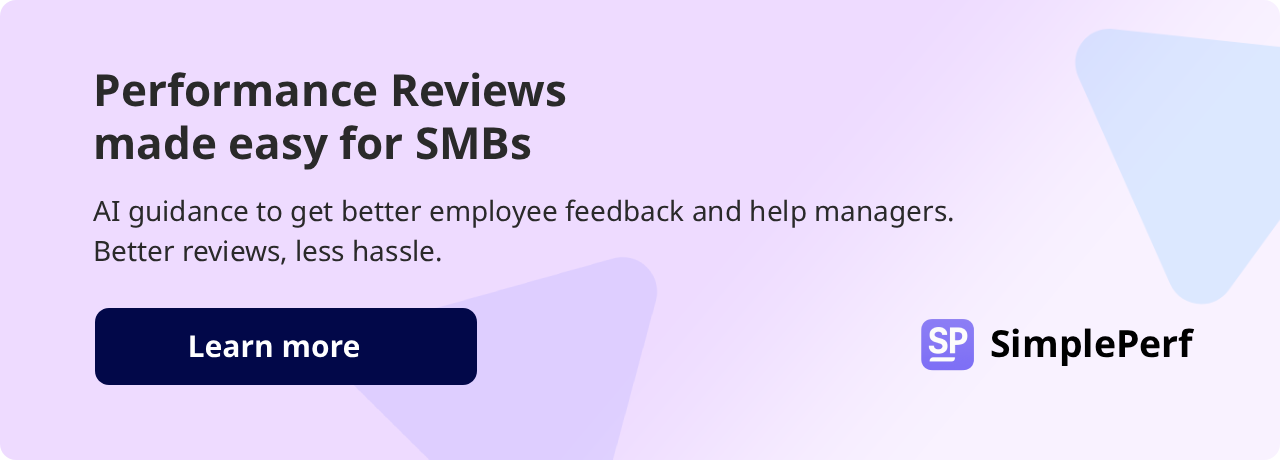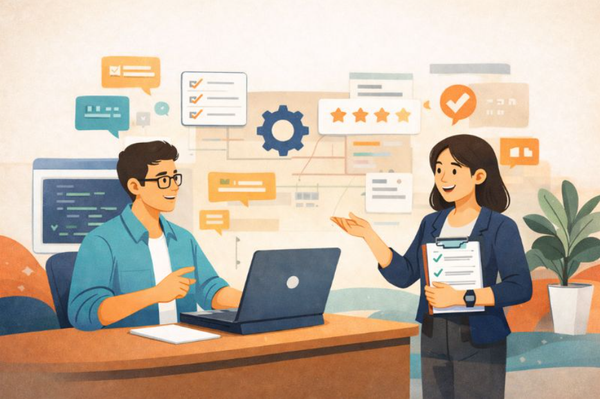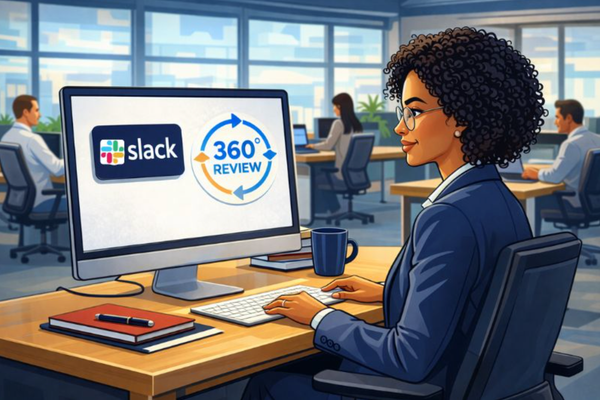Top 15 areas of improvement at work for ‘go-getting’ employees
Struggling to find meaningful performance review feedback for your top performers? Discover 15 powerful areas of improvement at work for go-getter employees from communication and leadership to data analysis and resilience to guide your next employee review with clarity and confidence.

You’re about to sit down with your top employee (let’s call her Paula) for the annual performance review, and you just know she’s going to ask you where she can make improvements to her work.
You love Paula’s enthusiasm; she’s what you would call a ‘go-getter’, and you’ve got a few in the team. The problem is: You’re running out of ideas. This is a good problem to have, and easily solved by checking out the ‘Top 15 areas of improvement at work for go-getter employees’ 👇.

1. Communication skills
One area of continuous learning for all employees is communication skills. The three main areas of focus are:
- Verbal communication skills,
- Written communication skills, and
- Body language usage
Begin by discussing your employee’s personal communication style with them, and if they’re not sure what that is, suggest completing a communication style quiz before the performance review. This will provide a good basis for your discussion.
One aim of personal and professional development is to improve written and verbal communication, but a Harvard Education review recently noted that nonverbal cues (body language) have 65%-93% more impact on communication. So, don’t neglect to address this area if your employee really wants to promote professionalism and be taken seriously.
2. Conflict resolution skills
Conflict seems to be something that many people shy away from. They would rather avoid tackling issues than ‘get into it’ with one of their colleagues. This avoidance rarely improves working relationships, and for this reason, the ability to navigate through conflict should be on the development list of any top performer.
Albert Einstein famously said, “In the middle of every difficulty lies opportunity. The world’s most famous genius was right. If you’re unsure where to start this conversation, use the Thomas-Kilman Conflict Mode instrument with your employee to determine their personal conflict management style. This is just one version of this type of assessment, with many others available online.
3. Emotional intelligence
People with emotional intelligence (EI) achieve success through their self-awareness because it promotes objectivity, internal motivation, empathy, and heightened social awareness. After writing his book titled ‘Working with Emotional Intelligence’, Daniel Goleman’s theories were liberally applied in training programs.
Claudio Fernandez-Araoz, in charge of executive searches for Egon Zehnder, compared 227
highly successful executives, with 23 who failed in their jobs. He found that the managers who failed were high in expertise and IQ, but low in emotional intelligence. Arrogance, over-reliance on brainpower, inability to adapt to economic shifts, and disdain for collaboration ultimately lead to their downfall. [1]
Ultimately, high EQ in teams translates into workplaces with high employee engagement. This is important, and according to a Gallup report, disengagement cost the world economy $438 billion in 2024!
4. Interpersonal skills
Another key element for organizational success is interpersonal skills, which are closely blended with EQ and communication skills. It can be defined as the ability to communicate and interact well with other people, whether your colleagues or customers.
Strong company values and trust build strong relationships, and so do opportunities for peers to acknowledge one another for doing the right things, at the right times.
By gamifying interpersonal skills with an app like Clappy Kudos, employees will be encouraged to interact with one another and promote company values. As peers interact with one another, new skills are organically transferred because everyone knows what is expected of them.
Team-building exercises can also be helpful for building good interpersonal skills within your team. It helps your team to see each other in a different light and provides a way for people to find common ground.

5. Listening skills
Active listening skills are crucial for communication, successful interactions, and exceptional customer relationships. In a world driven by technology, we spend less time really listening to what others are saying. While the advent of social media platforms and AI technology has made the world more connected than ever, it has also served to worsen the careful art of listening because attention is more fleeting.
New research by Accenture noted that two-thirds of global professionals are finding active listening a challenge. Highlighting this fast diminishing skill with your employees and explaining its importance for professional growth is only half the battle. The other half is continuous constructive feedback on their progress. Use the performance review to keep active listening alive.
6. Time management skills
These days, we’re all in a crunch to deliver more, work harder, and stay focused longer, and it’s taking its toll. The solution, however, is about more than teaching your team to manage their calendars; it's about speaking to them and discovering together what can be eliminated to prioritize tasks important for success.
According to the Pareto Principle, 80% of your results will come from 20% of your inputs. Ask which inputs will be more effective at maximizing productivity, and then give them priority. This goes beyond managing time to making working smarter.
Using a poll or survey is a great way to find out what your employees think about specific tasks and processes. It’s less confronting than a face-to-face meeting, and you can cut to the heart of the problem.
7. Technical skills
If we define technical skills as knowledge, information, and core competencies you need for optimal job performance, then you usually find your go-getters are recognized experts in their field.
One report has suggested that possessing advanced technical skills has the following benefits:
- Opens the door for promising career opportunities.
- Contributes to career advancement within organizations.
- Expands the scope of tasks you can undertake.
Strong organizational performance requires your top tier employees to be technically skilled at the highest levels, and if this is not the case, start here when offering constructive criticism.
8. Customer service skills
In jobs that require a high degree of interaction with customers, service skills are important and can be defined as:
- Customer retention: The ability to listen to concerns, resolve complaints and queries, and provide technical support.
- Personalization: Understanding how to make each experience unique for the person you are interacting with.
- Being proactive: A unique skill set that requires insight and understanding of the consequences, instead of only dealing with problems, and actively building a relationship.
Customer service is one area of continuous improvement where even the most diligent individuals can acquire new skills. One way of encouraging improvement in this area is to run role plays of actual customer service interactions and teach your team to handle them better.
9. Problem-solving skills
The ability to solve problems in a workplace, both simple and complex, is a sought-after skill by managers. Some people are naturals when it comes to problem-solving, while others need strategies to help them solve problems.
You can look for the following traits in your team members as an indication that they have strong problem-solving skills:
- Curiosity and open-mindedness: Seen as the desire to learn new things, and accept unconventional ideas and thinking.
- Analytical thinking: Defined as the ability to break down complex issues into smaller, more understandable components.
- Creativity and lateral thinking: Understood to be the ability to come up with innovative solutions by thinking outside the box, and connecting several unrelated ideas.
- Bias for action: Preference for moving forward quickly and confidently, adapting to change, and taking calculated risks.
10. Critical thinking
Although critical thinking is a term coined in the mid-to-late 20th century, organizations have never needed this skill more than they do today. Critical thinking involves the ability to improve thinking and reasoning based on factual, researched, and neutral viewpoints. [2]
A well-cultivated critical thinker is able to raise vital questions, gather and assess relevant information, recognize their own biases, and communicate solutions clearly to others.
In short, critical thinking is self-directed, self-disciplined, and self-corrective thinking. Positive feedback and guidance, providing improvement examples, are necessary for improvement in this area, along with formal training (if necessary).
11. Leadership skills
Professional development in one’s chosen career will require the acquisition of leadership skills, even if your employee won’t lead people. It’s a crucial skill for everyone who wants to understand themselves and others better and assertively chase development opportunities.
This may look very different for each employee on your team, but generally, go-getters have leadership abilities in their sights.
12. Adaptability skills and resilience
The essence of adaptability and resilience is a person’s ability to respond to changes in their environment and still thrive as a result. Resilience is associated with better employee engagement, work happiness, and employee performance. [3]
One way of building resilience is self-care, which should be encouraged in every workplace. Part of this is taking paid time off, which every employee needs as a way of unwinding and dealing with stress. The problem is that go-getters seldom think they need it, but encourage it anyway.
13. Collaboration skills
Collaboration means working together with one or more individuals to achieve a common goal, shared objective, or project. For deeper discussions about this development area, circle back to emotional intelligence and interpersonal skills.
A Stanford study from a few years ago found that even the mere perception of working on a task together can improve performance in individual team members.
14. Data analysis
Previously, data analysis was the domain of economics, business intelligence, and business analysis; however, with the rapid advancements in AI, a wide range of other fields are now being drawn into a data-driven market.
Gearing up your employees to understand how data is obtained, what it means, and how to use it intelligently will provide the competitive edge that all businesses are looking for.
15. Organizational skills
Organizational skills are the unique abilities that allow individuals to manage time, tasks, and use resources effectively.
Organizational skills are closely linked to time management, goal setting, problem solving, and critical thinking.
The benefits your go-getter team will get from having strong organizational skills are:
- Increased productivity.
- Reduced stress.
- Improved critical decision-making.
- Stronger working relationships.
- Enhanced promotional opportunities.
Conclusion
By using our list of 15 top areas of improvement at work for ‘go-getting’ employees, you’re sure to keep Paula and all your other go-getters happy at performance review time.
While there are many different areas of work that can be addressed to improve performance, these top areas can be applied to most employees across industries. Using them is sure to make your performance review discussions more meaningful and lead to better employee satisfaction.
Make your discussions even more productive by using the BuddiesHR suite of apps to help you collect data organically and manage many of your people processes through Slack.
With BuddiesHR, you can:
- Recognize employee performance.
- Increase a sense of employee belonging and collaboration.
- Track time management issues and blockers to productivity.
- Gather critical employee feedback.
- Measure how engaged your employees are in your organization.
- Run performance reviews systematically, with good performance data.
References:
1. Working with Emotional Intelligence
3. Resilience: A strong workforce needs it





